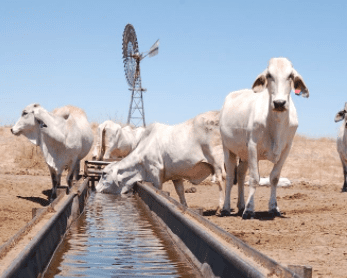METHANE yield* was slashed by 81 percent when trial cattle had access to water troughs dosed with a methane-reducing feed additive, indicating a new tool is emerging to help cattle managers relying on grazing production systems to lower their business’s methane emissions.
Rumin8’s water-based formulation delivered to cattle through water troughs opens up opportunities to reduce methane emissions from cattle in either remote rangeland operations, or those with few animal handling touch points, such as pasture/grass-based cattle production systems, the company says. There are currently no methane-reducing additives commercially available for these cattle.
 A controlled cattle study was run by Rumin8 in conjunction with research partner, the University of New England, to test the efficacy of two different formulations of Rumin8’s proprietary methane inhibiting product against a control group. One was administered a water-based formulation via water troughs suitable for pasture-fed cattle and the other was an oil-based formulation incorporated into a feedlot ration.
A controlled cattle study was run by Rumin8 in conjunction with research partner, the University of New England, to test the efficacy of two different formulations of Rumin8’s proprietary methane inhibiting product against a control group. One was administered a water-based formulation via water troughs suitable for pasture-fed cattle and the other was an oil-based formulation incorporated into a feedlot ration.
The active ingredient in Rumin8 is a manufactured version of the active ingredient found in aspargopsis methane-reducing seaweed.
The feedlot ration, incorporating Rumin8’s methane reducing oil formulation, achieved a 95 percent reduction in methane yield, UNE found.
Rumin8 chief executive officer David Messina said his company was pleased with the results as they built on the significant trial data-set that Rumin8 had generated with a range of formulations in a variety of production systems over the past three years.
“With so many cattle grazing grass around the world, the 81pc methane yield reduction achieved through water-based delivery was truly exciting, both in terms of addressable market and the positive climate impact this has the potential to create,” he said.
“Our collaboration with UNE also underpins our commitment to research excellence, as we work towards decarbonising the global cattle population and delivering effective and practical solutions for producers across a diverse range of production systems.
Runin8 has now concluded more than 20 trials across the world to demonstrate efficacy and safety, and to refine formulations.
As a result of the successful outcomes from these studies, Rumin8 has now entered into a longer-term agreement with UNE to expand the number and frequency of studies to be conducted at the university, and to accelerate the development and optimisation of products for commercial use.
In parallel, Rumin8 continues to progress its registration development programs in New Zealand, Brazil and the United States, with ongoing engagements with regulators in each country, the company said.
* The methane yield measurement is a preferred measurement of methane reduction as it quantifies the total amount of methane produced divided by the total amount of feed consumed (dry matter intake or DMI), to generate a more accurate assessment of the effect of the additive. Absolute methane measurements can be misleading because methane reductions can be achieved by reducing feed consumption, which is undesirable in meat and milk-producing animals.
About Rumin8:
Rumin8 is a Perth-based agriculture-focused climate tech company, using pharmaceutical technology to create affordable feed and water supplements that reduce methane emissions from livestock. Its patented process delivers pharmaceutical ingredients to interrupt methane production, as well as boost animal performance. The company is perfecting various formulations for diverse livestock feeding systems, including grassfed cattle, aiming to decarbonise 100 million cattle by 2030.
Source: Rumin8
